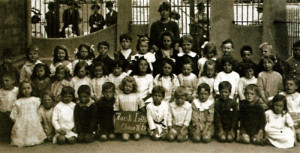
Looking back over almost 83 years it is suprising how relatively unimportant are the memories which the mind still retains. I was bom in a terrace house, one of a block of four, and can picture the small garden containing an old apple tree which, every year, produced a good crop of rosy dessert apples with a sweet flavour but with fruit always seeming to carry a family of maggots. At the bottom of the garden was a chicken run, and once my father noticed straw from the nests sticking out of the ground nearby. When he dug up the ground he uncovered a rats’ nest, which was dealt with as rapidly as possible: the rats probably came from up the stream which ran beyond the garden.
On another occasion my mother found that a mouse trap, set in a cupboard, had caught simultaneously a group of several tiny mice, and a photograph of this was needed as evidence for posterity. My elder sister took a few snaps with her box camera but when the film was developed it was found that she had put the film in the wrong way round! Even so, the ‘catch’ was reported in the local paper.
One year my father decided that the garden soil needed treatment with lime, and a pile of quicklime was delivered into our back yard. As a very small boy I was intrigued by the vast quantity of heat and steam produced as he poured water on it to slake it. Perhaps that reaction led to my later interest in chemistry.
A major event, when I was about eight, was the wedding of my elder sister Mabel, at which I acted as the pageboy. In those days expensive receptions were not considered so the party was held at our home. It seemed that every room, including the kitchen, was filled with guests, but the peak of the jollity was provided by a distant relative, one of the West Cocker contingent, who repeatedly hammered on the piano singing Play the Harp Gently, My Pretty Louise. Still, everyone appeared to enjoy themselves: happiness came from friendly, unsophisticated get-togethers in those days. Before they were married, my sister’s husband-to-be visited our family each Saturday evening and he could be relied upon to bring a bag of caramels to be passed around. Even now I can picture myself creeping under the dining room table, so as not to be sent to bed, until the remainder of the toffees were slid to me in my supposed hiding place.
In 1925 my parents, sister and I moved into a new detached house built on part of my father’s allotment, and next to my grandmother’s home, and my memory is of a long walk (about a mile) which I had to take twice a day in each direction – as I came home to dinnerat midday-to Yeovil School, whatever the weather. This journey involved passing the back of Brutton’s brewery with its steamy atmosphere, penetrating smell and lorries being loaded with the solid residue of the brewing process.
At school my main sporting interest was cricket, and in my final school year I gained my cricket cap as wicket-keeper, and twice had my little finger dislocated dealing with wide deliveries from our demon fast bowler. The finger was put back in to place by our umpire, the late Mr Darral Wood, whojoined the teaching staff the year I started attending the school. He was the amiable English master who occasionally forgot where he was due to teach, and had to be reminded.
My parents generally took their single week’s holiday at Weston-super-Mare, and if the week coincided with the Somerset Cricket Festival week there my father took me to watch the county side. I have pleasant memories of Arthur Wellard hitting the sixes over the trees surrounding Clarence Park.
When I was in a lower form, one of the class always had yellow-brown stains on his fingers, strong evidence of his cigarette smoking habits: enquiry from our no-nonsense mathematics master as to the source of these stains evoked the reply: “I have been painting our rabbit hutch, sir,” much to our amusement.
When I was young motorcycles were much sought-after vehicles for those who had graduated on pedal cycles and had a healthy bank balance, and during one summer holiday an uncle who worked in South Wales visited us and gave me a never-to-be-forgotten ride on the pillion of his Norton around the Dorset coast. In one of the lower forms at school was a boy named Norton and the young teacher of French, Mr Burbrige, discovered that Norton frequently got into a tangle in his attempts to overcome the mysteries of the language, leading in him being addressed as “LaVitesse” (speed).
About half-way through my years at Yeovil School we had a chemistry master, Mr. Porter (who gave me 100% in one exam), who was such an outstanding soccer player that he was given a place, as an amateur, in the Yeovil Southern League team. But his short stay at college might have been linked to the headmaster’s plans to change the school’s winter game from soccer to rugby. When I was a prefect in the sixth form the death occurred of the wife of the headmaster, Mr J.W. Pearson, and the prefects had the unusual duty of accompanying Mr Pearson and the other mourners from his house to the cemetery for the funeral service.
Schooldays for me ended in 1934 when I left to study at the University of Bristol.
Dr. E. G. E. Hawkins








